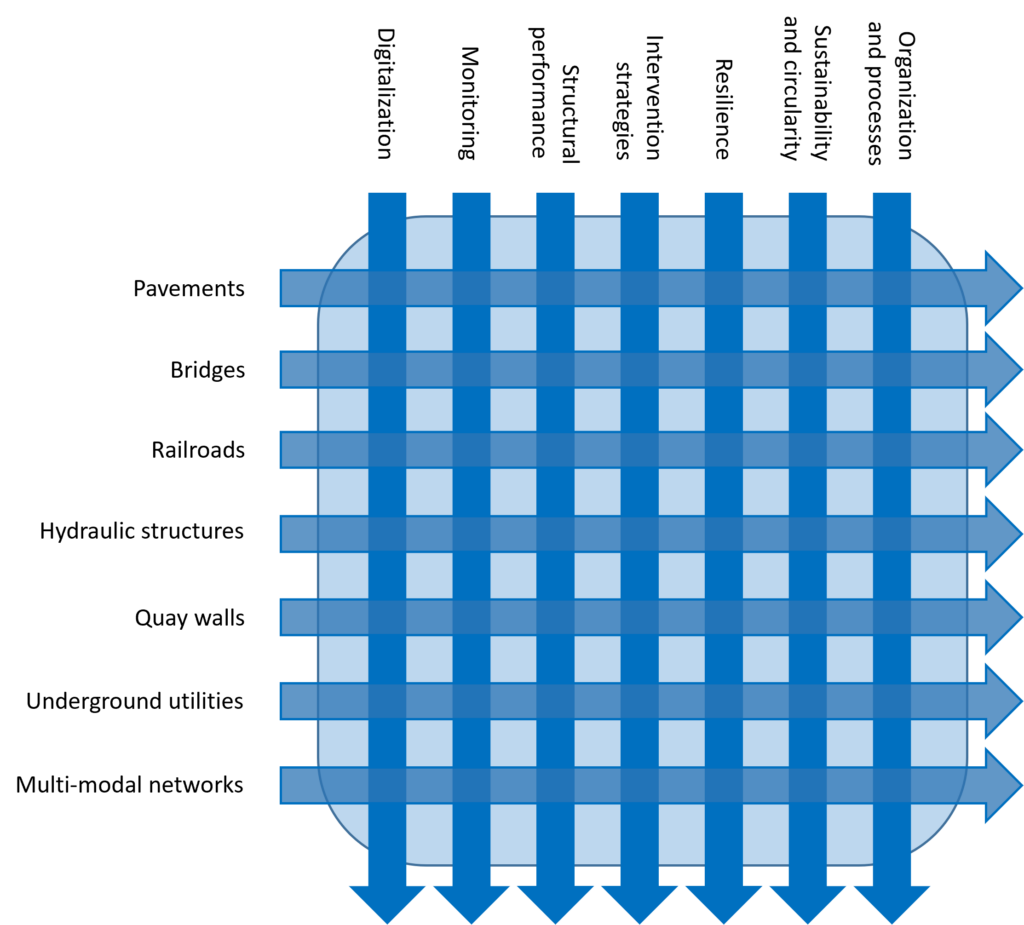Why Life Cycle Management?
Life Cycle thinking and acting have become increasingly important for anyone who takes part in designing, building, maintaining and operating civil structures and networks. After a period of industrialisation with huge developments of all kinds of large-scale construction projects in the post-war period in the last century, the ageing of the civil assets has become a significant concern. While society is mainly dependent on these assets, they are gradually strained by the passage of time and changing societal demands, making them technically and functionally obsolete. The tremendous investments needed are an economic challenge and an environmental burden. The scarcity of human labour and material resources and the cultural value of several civil structures add to the challenge. LCM addresses this complex and dynamic interplay of performance, risks and cost over the life cycle of civil structures. Life cycle thinking and acting are vital to ensure that civil structures are fit for future needs, resilient to expected and unexpected events, and cost-effective over time.
Why this LCM workshop?
The need for LCM is clear.The path to practical application remains challenging. The focus is still primarily on addressing immediate problems, meeting current requirements, and managing risks in the present. There is a need for a comprehensive and sector-wide breakthrough. The workshop aims to provide a platform for bringing together LCM initiatives, approaches, ideas and experiences from various civil engineering sectors to enlarge and strengthen the LCM community and drive this transition.
Why should you attend?
You experience the complexity of current challenges: the cost-efficient, resilient, and environmentally friendly renewal and renovation of our aged infrastructure under a scarcity of human labour and material resources? You would like to learn from research, best practices, exchange of ideas and knowledge in a vibrant LCM-community, in order to enlarge and strengthen yourself and the community? Then expect to be inspired by the workshop and its location, an early 20th-century fortress, isolated on an island, facing the North Sea on the west, and the largest sea lock in the world to the east. This sea lock also houses Europe’s largest pumping station, which is crucial for water defense in the Netherlands. Find out how this place combines challenges from the past, today and the future, and let us discuss the implication for LCM.

Workshop topics and field of interests
During the LCM workshop, practitioners and scientists will exchange ideas and views on Life Cycle Management. Workshop means interaction, active listening, and inspiring discussions. We offer the opportunity to organise science-to-practice sessions in which scientific LCM knowledge is made accessible for practice. This may include serious games, interactive simulations, or tool demonstrations
In the workshop, we will address relevant LCM topics around life cycle cost, life cycle risk and life cycle performance. These topics include:
- Digitalisation
- Monitoring
- Structural performance
- Intervention strategies
- Resilience
- Sustainability and circularity
- Organisation and processes
We are specifically interested in the intersection of these topics in several specific fields of interest:
- Pavements
- Bridges
- Railroads
- Hydraulic structures
- Quay walls
- Underground utilities
- Multi-modal networks
The objective of the International Association for Life-Cycle Civil Engineering, founded in 2006, is to promote international cooperation in the field of life-cycle civil engineering for the purpose of enhancing the welfare of society. Its mission is to become the premier international organization for the advancement of the state-of-the-art in the field of life-cycle civil engineering.
IALCCE encompasses all aspects of life-cycle assessment, design, maintenance, rehabilitation and monitoring of civil engineering systems. So far, IALCCE has organized eight International Symposia on Life-Cycle Civil Engineering. The next symposium will be held in Melbourne, Australia in 2025.
About the organizers
The IALCCE LCM-workshop 2024 is organized on behalf of the IALCCE under the auspices of IALCCE-NL.
The first IALCCE LCM-workshop was organized in 2019 in Rotterdam by InfraQuest, a collaboration between the TU-Delft, TNO and Rijkswaterstaat.
The organizing committee of the second IALCCE LCM-workshop 2024 is formed by Rijkswaterstaat, the Province of North Holland, the University op Delft and the University of Twente.


